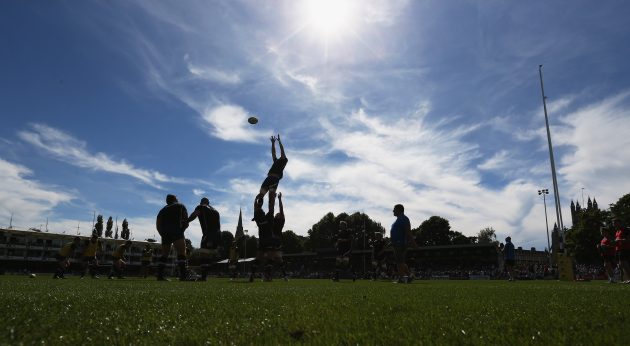'It's Cold At The End Of The Bed' is the rugby-themed debut novel of Peter Johnson, a Northampton captain of the 1970s. He tells us what motivated him to write the book
Dashed dreams – the rugby novel by former Millfield head Peter Johnson
Peter Johnson enjoyed a notable rugby career as a player, coach and administrator. A former hooker, his playing achievements include winning three Oxford Blues (1968-70) and representing the Army, Combined Services, Surrey, Harlequins and Northampton. He captained the Saints in the 1978-79 season.
After hanging up his boots at 32, he became a senior coach for the RFU and managed numerous tours to far-flung destinations. He was on the RFU Council for more than a decade and president of the English schools’ union from 2009-2012.
Yet it was his ‘day job’ at Millfield School, where he was headmaster from 1998 to 2008, that provided the biggest impetus for his recently published rugby novel, It’s Cold At The End Of The Bed, published by Troubador (£8.99).
The book charts the fortunes of two talented pupils, Sam Martin and (female) Charlie Woods, as they strive to overcome emotional and physical challenges. Rugby World spoke to Johnson about how his book came about…
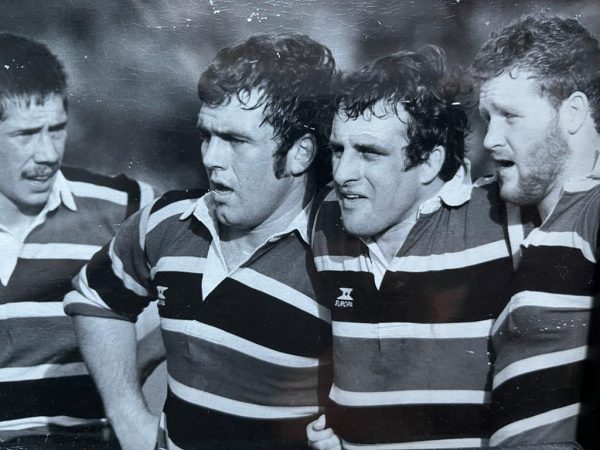
Hooker Peter Johnson playing for Saints in 1978. Gary Pearce and, right, Bobby Cox are his two props
Rugby World Why did you write this book?
Peter Johnson “After I retired from Millfield, I did a bit of consultancy work. But I got to the point where I’d had enough of doing reports and reviewing heads’ performance, and I thought I’d like to try and write.
I’d written for magazines, for the Varsity Match programme, a couple of articles on education for The Telegraph. But I thought, ‘I wonder if I can actually write’. So I went on a writing course with the Arvon Foundation. They are terrific, it was a one-week residential course in Totleigh Barton in deepest mid-Devon. It was a formative experience and my writing became my hobby in retirement. I’ve written two novels and I’m currently writing poetry.”
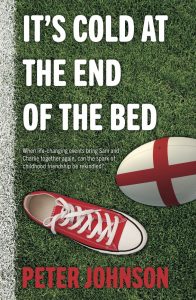
RW What was the specific motivation behind writing It’s Cold At The End Of The Bed?
PJ “I was in the parachute brigade for five years, and I was a troop commander of young soldiers. I then worked in schools with teenagers, so I had a lot of experience of teenagers, how they behave, how they react, the traumas they have. So I thought that’s good to draw on and basically the book is about the teenage years plus a bit.
And then my Millfield experience was of seeing so many young people wanting to do sport beyond the norm. Not just for fun but professionally. And we had people at Millfield. Our squash coach was Jonah Barrington, our cricket coach was Richard Ellison, the rugby coach is John Mallett. We had the most extraordinary set-up.
—————————————————————————————————————————————————-
DID YOU KNOW?
Millfield has produced nearly 50 England rugby internationals since WW2 – more than any other school in that time. Players who were at Millfield during Johnson’s headmastership included Chris Robshaw, Anthony Allen, Olly Morgan and Ollie Lindsay-Hague
—————————————————————————————————————————————————-
To put that in context, there were 23 former Millfield people in the Commonwealth Games. And in the Tokyo Olympics there were 13 from Millfield. Now this isn’t rugby but it is the culture. People wanting to play sport at the highest level. Helen Glover was one of my pupils, she came as a very bright hockey-playing athlete and ended up as one of the best female rowers in history.
So I was involved with people like that but you had to say, ‘This is a great ambition but you need some back-up’. Parents were so ambitious that they forgot about having options. As teachers we’d say, ‘What’s your back-up if you get a career-ending injury in the first year or two? How are you going to handle that?’ That fed the ideas about the novel.”
RW In the novel, Sam gets a contract at Bath…
PJ “Yes, some of our former pupils were at Bath. Including Henry Thomas, who by the time he was 27, 28, had had five operations. He spent months out of the game. He was a three A-grade A-level guy who is now doing, or has finished, an MBA. So he’s someone who has worked out that rugby is not the be-all and end-all.
He was very helpful in getting me to Bath, enabling me to see the Bath set-up and talk to players. People say, ‘I don’t know what the hell I’m going to do when I finish playing’.

England prop Henry Thomas, a former Millfield pupil, carries for Bath in June last year (Getty Images)
And it’s the camaraderie and being in a group all the time. Day in, day out, they become friends or sometimes enemies because there’s a lot of jealousy in these clubs; if you’ve got three scrum-halves and you’re not the first pick, you’re not desperate for one of them to play particularly well! So I found the culture of these clubs fascinating and I thought I could put this together.”
RW Charlie, the other main character, has to deal with disability…
PJ “My wife Chrissie and I understand disability. Tom, our first son, was born with spina bifida. He’s now 49 and a teacher at a big comprehensive in Chelmsford. I’m very proud of him, he’s been hugely inspirational to me.
We grew up having to make every provision for his disability. In a way that informed the novel: what about if one of these characters loses a leg? Of course, the terrorist incident [discussed below] was the bit of fact thrown in. But I thought this was interesting because of the idea of going on with normal life, in her case not in a wheelchair but their relationship and how she coped with it. It was the coping mechanisms.”
RW Do you think that the issues around early retirement, when a player’s career is ended suddenly by injury, are given enough attention in rugby?
PJ “I think they’re being given more and more attention, even while I was writing. I’ve done two novels but Wanda Whiteley, my editor, said I had to publish this one first as it’s current and it’s got real importance because this is an issue, not just in rugby but in all sports.

Marcus Trescothick suffered from mental illness (Getty)
Look at Max Whitlock, who’s just admitted having three months of retirement from gymnastics, and being completely depressed and unable to speak about it, but has now decided to try to get in the squad for the French Olympics. It’s about cricketers, Marcus Trescothick, Ben Stokes, they’ve reached the highest level but had desperate difficulties. We haven’t even mentioned head injuries in rugby.
So for me injuries are a major issue for professional sportsmen and women. And I thought if I could bolt on a coming-of-age love story onto that in my book it might be of interest, because it’s got an audience, it’s got a wider interest.”
RW There are other sensitive subjects in your book, such as suicide and adultery. There are also sex scenes and swearing. Who is this book aimed at?
PJ “One of the people who recently read it is Stuart Lancaster, who I knew when I was on the schools union, I did a couple of conferences with him. Stuart is a very intelligent man and an incredible coach. He read it and was very complimentary but he said which audience are you interested in? It’s a very fair question.
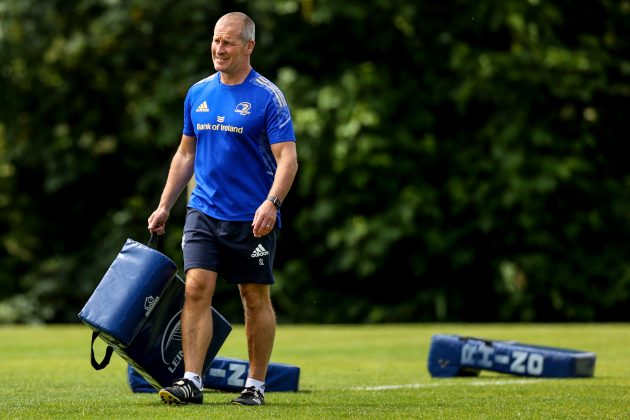
Stuart Lancaster at Leinster training. The ex-England coach will be DoR at Racing 92 next season (Inpho)
While I was writing it, I wasn’t sure. There was never a target audience initially, I just wanted to write a book that I could be proud of. And then we’ll see what happens. But my son Tom said he feels this is a book for young adults, so I’ll be going to his school to talk to the sixth form about it and they’re going to introduce it to their library.”
RW As mentioned, your book features a real club, Bath, as well as a real event in the 2017 terrorist incident on London Bridge. Why the merging of fact and fiction?
PJ “Because your characters are real people in your head when you’re writing. I lived and breathed Sam and Charlie for two years. They were in my head the whole time. I’d wake up in the night having thought of something they might have said, and I’d write it down.
I wanted people to recognise an incident. The London Bridge incident was one of the most famous acts of terrorism. I know a bit about terrorism because I did tours of Northern Ireland and saw some pretty brutal things. And there’s an extra trauma in being a victim. Poor old Charlie just happened to be walking across that bridge at the wrong moment.

Harlequins in 1975-76, with Johnson sat second from left. The coach (front row) is All Black Earle Kirton
I went to see a surgeon who was on duty that night, and the brutality of someone driving into someone on the bridge was not as bad as the knife wounds that were experienced by people in Borough Road Market. It was carnage. You talk to a doctor on duty and you discover just the sort of wounds these people received.
And you needed to be a really strong character to get through it. And I love the character of Charlie, she’s a really strong woman. But too strong for Sam. She’s very likeable in some ways but pretty hard in others.
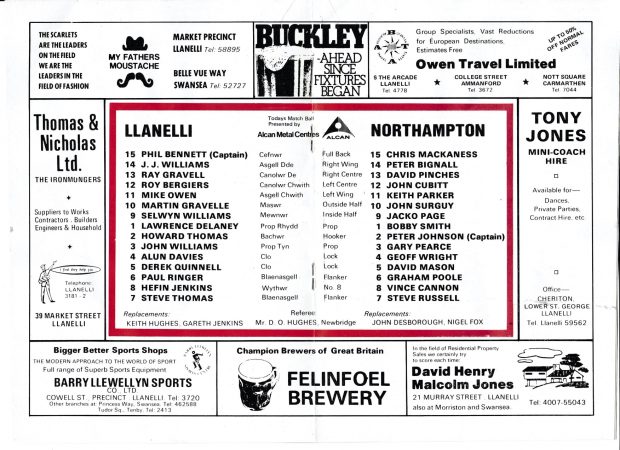
Llanelli v Saints teams, Easter 1978. “Stradey was fabulous, one of the great grounds,” says Johnson
So it was bolting recognisable events to characters, ‘Oh God, she’s experienced that, it must have been awful’. And I wanted Bath to seem real, I was there for a whole day, talked to Henry about it, talked to Dave Attwood, various people.
Because you really want your characters to feel real. I want rugby players to read it and go, ‘Yeah, I’ve seen young players come into the club and have ambitions, and it’s really difficult when they stop and haven’t got that family around them’.”
RW A proportion of the book proceeds will go to the Johnson Scholarship Fund. Can you explain what that is?
PJ “Millfield is regarded as one of the richest schools in the country but it’s not. It’s a very young school, only 86 years old, and it gives a huge number of scholarships but a very high proportion of that comes out of income. I was a state-school boy from South London and I’m very passionate about Millfield’s ability to give a major proportion of its pupils some support.
The fund that’s been founded in my name emerged from a farewell dinner in 2008 that raised more than £60,000. It’s for sixth-form entry, full awards, and offers opportunities for bright people from less privileged backgrounds. So my book is a chance to support that.”
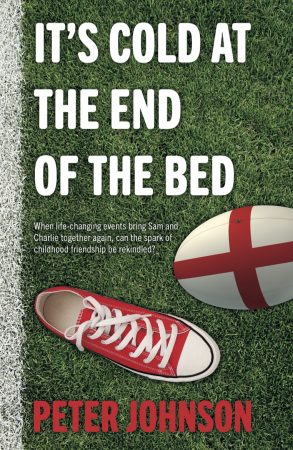
It’s Cold At The End Of The Bed, written by Peter Johnson and published by Troubador, is available in paperback for £8.99 or on Kindle for £3.99.
Download the digital edition of Rugby World straight to your tablet or subscribe to the print edition to get the magazine delivered to your door.
Follow Rugby World on Facebook, Instagram and Twitter.





